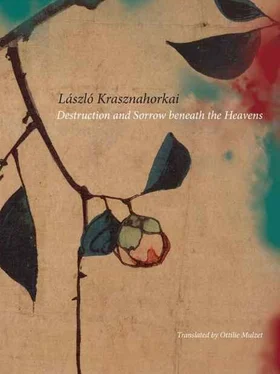László Krasznahorkai - Destruction and Sorrow beneath the Heavens - Reportage
Здесь есть возможность читать онлайн «László Krasznahorkai - Destruction and Sorrow beneath the Heavens - Reportage» весь текст электронной книги совершенно бесплатно (целиком полную версию без сокращений). В некоторых случаях можно слушать аудио, скачать через торрент в формате fb2 и присутствует краткое содержание. Год выпуска: 2016, Издательство: Seagull Books, Жанр: Публицистика, Путешествия и география, на английском языке. Описание произведения, (предисловие) а так же отзывы посетителей доступны на портале библиотеки ЛибКат.
- Название:Destruction and Sorrow beneath the Heavens: Reportage
- Автор:
- Издательство:Seagull Books
- Жанр:
- Год:2016
- ISBN:нет данных
- Рейтинг книги:5 / 5. Голосов: 1
-
Избранное:Добавить в избранное
- Отзывы:
-
Ваша оценка:
- 100
- 1
- 2
- 3
- 4
- 5
Destruction and Sorrow beneath the Heavens: Reportage: краткое содержание, описание и аннотация
Предлагаем к чтению аннотацию, описание, краткое содержание или предисловие (зависит от того, что написал сам автор книги «Destruction and Sorrow beneath the Heavens: Reportage»). Если вы не нашли необходимую информацию о книге — напишите в комментариях, мы постараемся отыскать её.
Destruction and Sorrow beneath the Heavens
Destruction and Sorrow beneath the Heavens
Praise for Krasznahorkai “The contemporary Hungarian master of the apocalypse.”—Susan Sontag
“Krasznahorkai delights in unorthodox description; no object is too insignificant for his worrying gaze. . He offers us stories that are relentlessly generative and defiantly irresolvable. They are haunting, pleasantly weird, and ultimately, bigger than the worlds they inhabit.”— “Krasznahorkai is an expert with the complexity of human obsessions. Each of his books feel like an event, a revelation.”—
Destruction and Sorrow beneath the Heavens: Reportage — читать онлайн бесплатно полную книгу (весь текст) целиком
Ниже представлен текст книги, разбитый по страницам. Система сохранения места последней прочитанной страницы, позволяет с удобством читать онлайн бесплатно книгу «Destruction and Sorrow beneath the Heavens: Reportage», без необходимости каждый раз заново искать на чём Вы остановились. Поставьте закладку, и сможете в любой момент перейти на страницу, на которой закончили чтение.
Интервал:
Закладка:
The first air-conditioned luxury bus arrives at eight o’clock in the morning from the main highway, and then the buses pull in and pull in and pull in, one after the other, without stopping, they begin to stream outward as if from some bottomless sack, and tourists begin to flood in, inundate, fight their way inside, as hundreds and hundreds of newer groups, arriving relentlessly like an attacking army, in an unbelievably short amount of time they occupy the end of the Ming era, or the beginning of the Qing, and the tour guides begin to yell, they begin to yell in that loathsome, thin voice into their megaphones and, by the time the two visitors realize what has happened, Zhou-zhuang is already full, so full that by eight-thirty it is impossible to move in the narrow streets, they are terrified, they don’t know what is going on, they’ve hardly woken up, they are sitting in the same teahouse as last evening and suddenly they are struck by a hideous clamour: the tourists are cheerful, they are yelling and screaming and making a rush at whatever they can, descending upon the marvellous little houses, completely denuded now of last night’s tranquillity, and it seems that they are happy to see daytime arrive, inside there are shelves and countless goods: food, sweets, souvenirs, genuine pearls, dried fish, folksong cds, hundreds and hundreds of trinkets: What has happened here? — the two visitors look at each other, and then say goodbye to the elderly teashop owner who urges them not to miss out on the Zhen, Zhang and Shen residences, they will be open very soon, he says, but they are trying to struggle through the dense crowds to somewhere outside, they haven’t the slightest idea exactly where this outside is, in any event, they try and push themselves forward against the crowd, because they have deduced from the crowds’ movements that they must go to wherever they, the crowds, have come from; Zhouzhuang is small, so they reach the highway in a relatively short time, they stop at one point and, as they have seen the Chinese do, they wait there, they wait patiently for something to arrive, a bus which they can wave down and which will then take them onward, even if they are not able to say right now when a bus will come or where this onward is; the interpreter is asked: Where are you going, and he has to say something, so he looks at Stein — where? — and Stein pronounces the single place name he can recall from Yang Lian’s account, Zhujiajiao, at which the bus driver shakes his head, he doesn’t go there, that’s not in this direction, but if they want he can take them to Tongli. Tongli? — the interpreter looks at Stein unhappily, and he says fine, let’s go to Tongli, so that after half an hour they’re in Tongli, the bus lets them out again by the side of the highway, and for the time being everything is quiet, the region seems relatively uninhabited, this is a good sign, they reassure each other, Zhouzhuang is like a prison, it opens at eight in the morning and closes at six in the evening — they had gleaned this from a sign as they were fleeing — and maybe, the interpreter adds, that woman who led us into the village last night was trying to explain to us that we had come at a good time, because it was after six o’clock, and Zhouzhuang is completely different then, maybe that’s what she was trying to say, the interpreter suddenly realized, but maybe Tongli is different, he says, maybe Tongli is just a simple village and we won’t have to encounter any kind of barbarian attack as in Zhouzhuang — Stein is silent; 200 metres away from the road a few tile-ridged roofs can be seen, so they set off in that direction, and they are not mistaken as far as the direction is concerned because it immediately emerges that Tongli is indeed that way; the direction, however, is the only thing in which they have not made a mistake; as for their own selves, they are very mistaken because, after 200 metres, the brutal truth swoops down upon them that here too there is nothing for them to seek, once again they have miscalculated, once again they have rushed into something, because if they would have to state that Zhouzhuang — left in peace only at night — was firmly in the hands of the tourist industry, then Tongli — this little water-town, just as enchanting — is manifestly the general headquarters of every tourist office for all of Jiangsu as well as the centre of touristic dreams of the province and half of China, once again a wondrous settlement from the past, the same narrow streets, the same narrow canals with the same black, slowly drifting boats, the same saltpetre walls and the same gateways and teahouses and the same enthrallingly carved crimson-brown lacquered pavilions, facing the water, but the swarming hordes seeking entertainment, the sheer havoc-wreaking number of tourists surpasses every conceivable measurement here, surpasses even the ruinous crowds of Zhouzhuang, and what they at least did not have to perceive while escaping from that latter place here surrounds them: that everything here is for sale, and this everything must be sold, this can be seen on the hunted expressions of the locals, or whoever they are, as at the same time from the other side comes the response that everything must be bought, that we will buy everything, this is what radiates from the expressions of the tourists, what is taking place here is unspeakably repugnant, so they decide to take a look at the three residences mentioned in the tourist guide vitrines, which they had failed to do in Zhouzhuang, so they pick themselves up and conclude their excursion. What they see is exquisitely beautiful again, the wondrous Tuisi Garden, the wondrous Jicheng and Feigong residences, the wondrous canal banks, the houses, the bridges, everything is just as dazzling as it could possibly be, but they must escape because they cannot bear what is happening here, they cannot bear the unspeakably repugnant merchandising of these wondrous enclosed strata of ancient times; once again they stand by the highway, once again they don’t move from that spot, and then they begin to think a little bit, and then they both reach the same conclusion: that there is no mercy; if this is how it is in Zhouzhuang, if this is how it is in Tongli, then this is how that will be in Wuchen, in Lili, in Xinshi, in Linghu, in Doumen, in Nanxun, in Xitang, in Dongyang and in Wujian and everywhere in this formerly enchanting landscape, so then they slowly trudge across to the other side of the highway, they begin to watch the buses going back, then they get on to the first vehicle returning to Shanghai, and in the days to follow they do nothing but gape at the ultra-modern buildings of Pudong from the railing of River Huangpu, and they try to remain awake, to clutch at reality, and to forget, forget — to forget what they saw, to beat out of their heads the fact that they saw anything at all.
4. Requiem in Hangzhou
In one of the world’s most beautiful cities, in the unparalleled administrative seat of the Southern Song dynasty,[69] from the first moment until the last, they never feel any sort of disappointment. Hangzhou does not lie. It can be seen that there was splendour and brilliance here, there was erudition and intellect, it can be seen that the current conspicuous and exceptional wealth of the city is not due simply to the new era of Deng and Deng’s followers but that it follows upon former wealth; Hangzhou, nonetheless, does not claim for itself, among all this new prosperity, any connection to the past which, of course, is indestructible in the same sense as the scene of a murder or an obstinate memory in the brain — no, Hangzhou announces, you won’t find that here, no point looking for anything — and the fact that people keep coming is due simply to the present of the past that was once here, but Hangzhou doesn’t say anything like that, it doesn’t deceive because it has no need of deception, it propagates its new name in place of the old, and it has the right to do so from pride, from self-esteem: here is the new, the wealthy Hangzhou, and it does not wish to display itself in any kind of role that would tie it to the old, it has accepted that the old is gone, and it is happy for whatever residue has remained, this is Hangzhou today and, thanks to this, they feel above reproach for the first time, that is, they would feel above reproach if the rain were not constantly pouring down, if it wasn’t cold, if the sky wasn’t eternally cloudy, meaning that the other side of the lake was never visible, not even for a single hour, but fine, in spite of all this everything is fine because they have no expectations, and they are not obligated to take anything to task here, because in the Hangzhou of today there isn’t anything to take to task, they enjoy the former splendour dimly glimmering here and there, they enjoy it, and they are satisfied with that much, and if in the meantime the thought arises in Stein: God Almighty, what astounding beauty there must have been once in this city, if after so much definitive destruction you can still sense something of it, like a draft of air where an amputated leg used to be. Because that’s what he feels, László Stein corrects the explanation of the interpreter who has got entangled in this, when after a few days he asks what the problem is: he finds it unusual that Stein is so silent — he tends to feel, Stein says, that it was beautiful, that it was so incredibly beautiful here, that China’s most eternally famous lake was beautiful, the Xihu[70] or West Lake, celebrated by the greatest poets more beautifully than anything else, that Gushan island (‘Orphan Mountain Island’)[71] was beautiful, and the two dams, Bai Juyi,[72] in the lake, that the Chan Buddhist[73] Jinci temple[74] was beautiful, that Feilai Feng (‘The Peak That Flew Hither’),[75] and Yuhuangshan (‘Jade Emperor Mountain),[76] and Leifeng Ta (‘Storm Peak Pagoda’),[77] and Yuquan (‘Jade Spring’),[78] and Hupaquan (‘Running Tiger Spring),[79] and the tea plantations of Longjing[80] were beautiful, indeed breathtaking, and that something has remained of everything here, like a kind of hint, is beautiful as well; in fact, they could even say that many things have remained and, with the help of a tour guide, contacted through Tang Xiaodu, they are seeking out these many things, although they don’t feel any amazement at all when their guide takes them first to his own secret lookout, in the freezing rain, to the slippery cliffs atop the mountain in Gushan, promising that from there, from above, from that height which he has loved greatly since his childhood, they will see all of Xihu and all of Hangzhou, and it never even occurs to them to ask him where these things are, because from up there nothing but nothing in the entire God-given world can be seen, the lake and the city are enveloped in thick fog while the sky is covered by heavy clouds; their newly found friend is sad, Stein, however, is not, because he is aware that to see Hangzhou would not be possible even in bright sunshine, but he does not try to explain what he is thinking, he just consoles his friend that even like this it is beautiful, and that he is being very kind and what they can see from of the lake is very pretty: the fog, and the clouds above Hangzhou, this is enough, enough just to be here, and to be able to see the former Longjing tea plantations and the little village where the tea planters lived and live even today, just as they realize with joy that they can see the city’s most famous temple or, rather, what has become today of Lingyin Si temple,[81] a soulless place of pilgrimage, victimized by its restoration, because that was the place where. . but chiefly what makes them happy is when their enthusiastic guide takes them to the magical Feilai Feng, the mountain known as the Peak That Flew Hither, he takes them into what is undoubtedly one of the most significant — and hardly known — works of Buddhist sculptural art in the world, and it has an enormous effect upon them, here and now, beneath the earth, standing face to face with them: no one was able to destroy these Buddhas and bodhisattvas and luohans and monks, carved, in their immortal beauty, into the walls of the interconnected watery caves, but — and this is the thing that is really breathtaking — no one was even able to disturb them, maybe these statues carved into the walls of appallingly hard rock could have only been detonated, but no one got around to it, and now it’s too late, now they are protected by the so-called dominant trend of the preservation of national culture as well as by the significant proceeds originating from the armies of tourists flooding this place, in short, here they are, perfect, undamaged, drenched in the water dripping from the ceilings of the caves, and nowhere else, not in any other temple cave, can such terrifying faces be seen, nowhere else can such uncanny suggestive gazes be seen, such an unearthly radiance from the eyes, not in Longmen,[82] not in Datong,[83] nowhere else, just here, beneath the earth, in the depths of the mountain, so that when at twilight their young guide takes them to Gushan to see a friend, Ge Youliang, who, as the owner of the renowned Louwailou pavilions,[84] opens up the magnificent lacquered doors, looking onto the lake, and in his teashop graciously invites them to sit down and offers them a cup of the very best Longjing tea, Stein’s happiness is genuine, because he wasn’t hoping for anything from old Hangzhou, and he didn’t get anything, it was good on that cliff peak, though, he reassures his companion later on, it was good in Longjing, it was good below Feilai Feng and it was good in the tea pavilion on Gushan, and Xihu, says Stein, was beautiful, as its motionless mirror-like surface, from the breath-like touch of the thousands and thousands of raindrops, glittered in the twilight thousands and thousands of times; so that everything is perfectly fine, he reassures the interpreter, and in a few days they set off to meet one of the most outstanding figures of artistic life in Hangzhou, the deputy director of the kunqu theatre, they set off in order to somehow entangle themselves back into reality, back into forfeitous reality, back to where they had been led by their own superfluous interest and their own faulty presumptions, back into disappointment, the disappointment that what they believed to exist, to be alive, is gone, is not alive, back to the feeling — in the embittered words born of human dignity and serenity — that for them here, in this China, with their own great love for the exquisite treasures of this culture, there is nothing, but nothing for them to look at any more.
Читать дальшеИнтервал:
Закладка:
Похожие книги на «Destruction and Sorrow beneath the Heavens: Reportage»
Представляем Вашему вниманию похожие книги на «Destruction and Sorrow beneath the Heavens: Reportage» списком для выбора. Мы отобрали схожую по названию и смыслу литературу в надежде предоставить читателям больше вариантов отыскать новые, интересные, ещё непрочитанные произведения.
Обсуждение, отзывы о книге «Destruction and Sorrow beneath the Heavens: Reportage» и просто собственные мнения читателей. Оставьте ваши комментарии, напишите, что Вы думаете о произведении, его смысле или главных героях. Укажите что конкретно понравилось, а что нет, и почему Вы так считаете.












